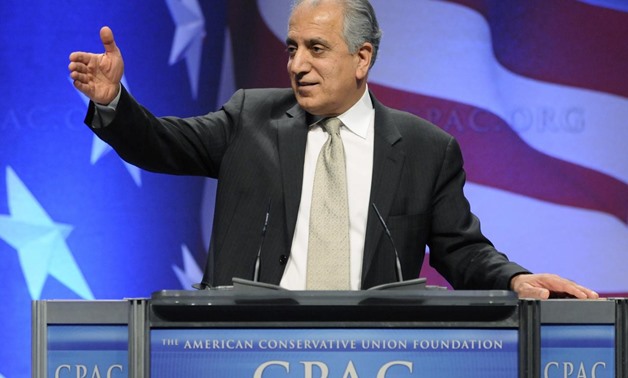
FILE PHOTO: Zalmay Khalilzad, former U.S. ambassador to Afghanistan, Iraq and the United Nations, leads a panel discussion on Afghanistan at the Conservative Political Action conference (CPAC) in Washington, February 12, 2011. REUTERS/Jonathan Ernst
KABUL - 14 October 2018: Taliban leaders will continue to have discussions with the newly appointed U.S. special envoy for peace in Afghanistan, the group said on Saturday, a move that could accelerate diplomatic engagement between the warring sides.
Zalmay Khalilzad, an Afghan-born U.S. diplomat, met Taliban leaders in Qatar on Friday in an effort to find a way to end the 17-year-old war in Afghanistan.
"Both sides spoke (about) an end to the occupation and a peaceful solution to the Afghan issue ... Both sides agreed to continue meeting in the future," Taliban spokesman Zabiullah Mujahid said in a statement.
Khalilzad arrived in Kabul on Saturday and briefed Afghan President Ashraf Ghani about his 10-day tour of four countries, which ended with the meeting with leaders of the hardline Islamist militant group.
According to Taliban sources, the two sides arrived with tough conditions.
"It was an introductory meeting in which an eight-member U.S. delegation held a detailed meeting with members of our political office," said a senior Taliban member. Sher Mohammad Abbas Stanakzai, who is the head of Taliban's Qatar office, led the discussions, he said.
Another senior member of the Taliban said Khalilzad had asked the Taliban leadership, based in the Qatari capital Doha, to declare a ceasefire in Afghanistan for six months, starting before the Oct.20 parliamentary polls.
"Both sides discussed prospects for peace, and the U.S presence in Afghanistan," said another Taliban official, requesting anonymity.
In exchange, the Taliban want the Afghan government to release fighters from jails across the country and the swift removal of foreign forces fighting alongside Afghan troops.
A Taliban source said the U.S. delegation proposed forming different committees to handle the release of prisoners.
"Neither side agreed to accept the other's demands immediately, but they agreed to meet again and find a solution to the conflict," he said.
KEY ROLE
Khalilzad was appointed last month, as President Donald Trump's administration launched fresh efforts to hold peace talks with the Taliban.
A senior official working with the Afghan president said Khalilzad had briefed Ghani about his meetings with senior ministers and top diplomats in four countries who could play a key role.
Khalilzad's trip started in Afghanistan and he travelled to Pakistan, the United Arab Emirates, Saudi Arabia and Qatar before returning to Kabul.
A statement about Khalilzad's diplomatic tour released by the U.S. embassy in Kabul did not confirm his meeting with the Taliban.
"The United States shares the aspirations of all Afghans for a peaceful Afghanistan where all Afghans see themselves included. All citizens of Afghanistan must be a part of this reconciliation process," said Khalilzad, according to the embassy statement at the end of his four-nation tour.
Continued fighting has raised questions about the viability of the U.S. strategy to end the war, which for the past year has focused on forcing the militants to the negotiating table, largely via more air strikes.
Last week the Taliban demanded a complete withdrawal of foreign forces as the only solution to end the war that began with the 2001 ousting of the former Taliban government by U.S.-led forces after it refused to hand over Osama bin Laden following the 9/11 attacks on the United States.
They have ramped up attacks in strategic provinces and have also directed Afghans to boycott the parliamentary elections.
At least 8,050 Afghan civilians were killed or wounded in the first nine months of 2018, almost half of them targeted by suicide bomb attacks and other improvised devices that may amount to war crimes, the United Nations said last week.


Comments
Leave a Comment